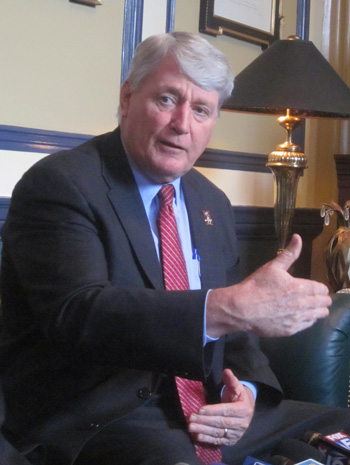By Megan Poinski
[email protected]
Without enough supporters in the House of Delegates to guarantee its passage on Friday, the same-sex marriage bill was sent back to the Judiciary Committee, and the issue will not be picked up again in 2011, according to House leaders and backers of the bill.
After the issue passed the Senate last month, same-sex marriage supporters thought that the bill would easily sail through the House of Delegates to passage. However, the solid support thought to exist in the House evaporated as committee hearings began, with co-sponsors waffling on their support. The committee sent the bill to the House floor on a razor-thin vote.
Delegates spent about three hours debating the issue on Friday, sharing their deeply held personal convictions and poignant personal stories in sometimes emotional floor speeches. Meanwhile, intense negotiations continued on the floor, but it was clear that the members of the House were starkly divided.

After Friday's session, Speaker of the House Michael Busch explains what comes next in the drive to legalize same-sex marriage.
“It was very close, and there was a chance it would have passed,” House Speaker Michael Busch told reporters after the session adjourned. “But we are here for a four-year term.”
Busch and Majority Leader Kumar Barve, the bill’s lead sponsor in the House, said that in the year between now and the start of the 2012 session, delegates will have time to process the issue, find out where their constituents stand, learn about the nuances of same-sex marriage, and craft a bill that addresses their concerns.
Busch said about a third of the Democrats were likely to vote against the bill. The caucus did not make any judgments about people based on their support of the bill, he said, and let people vote their conscience.
“It is a distance run, not a sprint,” Busch said. “There is no necessity to pass the bill in the first year.”
Busch said that the decision was made not to take a vote because it may have been difficult for some delegates to vote against it this year, then vote for it in the future. He said that no local or national gay rights groups had pressured him to ensure that Maryland did not vote down the measure.
Sen. Jamie Raskin, the floor leader in the Senate, told reporters and some Equality Maryland supporters that there was still work that needed to be done to get to the point where same-sex marriage will be law in Maryland.
“It’s incredibly encouraging how far we’ve come,” he said.
Senate Minority Leader Nancy Jacobs, who vowed to start the process to bring the issue to a referendum if the bill passed both chambers, said after the session that she had known for a few hours that the bill would not pass the House.
Busch said that Friday’s floor debate was the best he had seen in his 25 years at the State House.
Punctuated by family stories and personal recollections, Friday’s debate was both intensely civil and personal. Five of the House’s seven gay delegates shared their own stories. Delegates who were opposed to the legislation talked about history and their own religious beliefs.
Del. Heather Mizeur, D- Montgomery County, who considers herself a deeply spiritual Catholic, and who has been married to her wife for 5½ years, said that she wrestled with the discrepancy between being gay and being religious. She found peace when she realized the only voices telling her there was anything wrong with it were from other people. She asked her colleagues to vote for “love.”
“Love makes a family, and marriage protects it,” she said.
After the bill was sent back to commitee, Gov. Martin O’Malley issued one of his strongest statements supporting the legislation:
“It is my firm belief that equality under the law means equality for everyone, and our laws should reflect that fundamental principle. Together, we’ve worked hard to protect and expand these rights for lesbian, gay, bisexual and transgendered citizens in our state. It was my hope to sign a marriage equality act consistent with these progressive reforms, while protecting religious freedom in our state.”
—Len Lazarick contributed to this report




Recent Comments